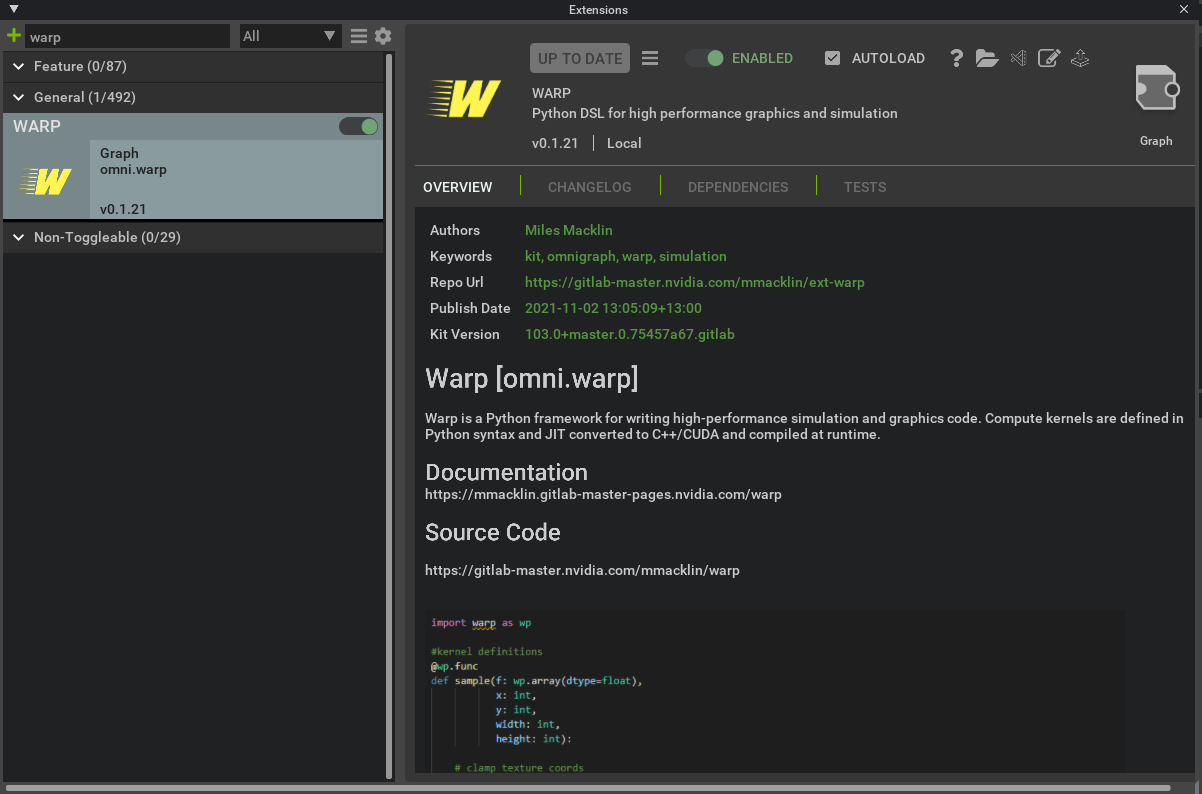Warp is a Python framework for writing high-performance simulation and graphics code. Kernels are defined in Python syntax and JIT converted to C++/CUDA and compiled at runtime.
Warp is designed to make it easy to write programs for physics simulation, geometry processing, and procedural animation. Please refer to the project Documentation for API and language reference and CHANGELOG.md for release history.
A selection of physical simulations computed with Warp
Warp supports Python versions 3.7.x-3.9.x. The easiest way is to install from PyPi:
pip install warp-lang
Pre-built binary packages for Windows and Linux are also available on the Releases page. To install in your local Python environment extract the archive and run the following command from the root directory:
pip install .
An example first program that computes the lengths of random 3D vectors is given below:
import warp as wp
import numpy as np
wp.init()
num_points = 1024
device = "cuda"
@wp.kernel
def length(points: wp.array(dtype=wp.vec3),
lengths: wp.array(dtype=float)):
# thread index
tid = wp.tid()
# compute distance of each point from origin
lengths[tid] = wp.length(points[tid])
# allocate an array of 3d points
points = wp.array(np.random.rand(num_points, 3), dtype=wp.vec3, device=device)
lengths = wp.zeros(num_points, dtype=float, device=device)
# launch kernel
wp.launch(kernel=length,
dim=len(points),
inputs=[points, lengths],
device=device)
print(lengths)The examples directory contains a number of scripts that show how to implement different simulation methods using the Warp API. Most examples will generate USD files containing time-sampled animations in the examples/outputs directory. Before running examples users should ensure that the usd-core package is installed using:
pip install usd-core
USD files can be viewed or rendered inside NVIDIA Omniverse, Pixar's UsdView, and Blender. Note that Preview in macOS is not recommended as it has limited support for time-sampled animations.
Built-in unit tests can be run from the command-line as follows:
python -m warp.tests
For developers who want to build the library themselves the following tools are required:
- Microsoft Visual Studio 2017 upwards (Windows)
- GCC 4.0 upwards (Linux)
- CUDA Toolkit 11.3 or higher
- Git LFS installed (https://git-lfs.github.com/)
After cloning the repository, users should run:
python build_lib.py
This will generate the warp.dll / warp.so core library respectively. When building manually users should ensure that their CUDA_PATH environment variable is set and dynamic libraries can be found at runtime. After building the Warp package should be installed using:
pip install -e .
Which ensures that subsequent modifications to the libary will be reflected in the Python package.
If you are cloning from Windows, please first ensure that you have enabled "Developer Mode" in Windows settings and symlinks in git:
git config --global core.symlinks true
This will ensure symlinks inside exts/omni.warp work upon cloning.
A Warp Omniverse extension is available in the extension registry inside Omniverse Kit or Create:
Enabling the extension will automatically install and initialize the Warp Python module inside the Kit Python environment. Please see the Omniverse Warp Documentation for more details on how to use Warp in Omniverse.
Please see our GTC Presentation for more details on Warp.
We have a #warp channel on the public Omniverse Discord sever, come chat to us!
Warp is provided under the NVIDIA Source Code License (NVSCL), please see LICENSE.md for full license text.




